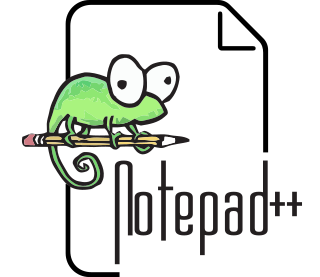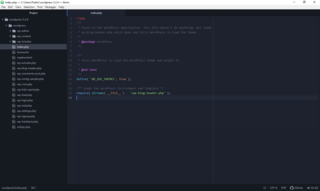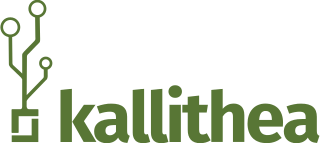
Media Player Classic (MPC), Media Player Classic - Home Cinema (MPC-HC), and Media Player Classic - Black Edition (MPC-BE) are a family of free and open-source, compact, lightweight, and customizable media players for 32- and 64-bit Microsoft Windows. The original MPC, along with the MPC-HC fork, mimic the simplistic look and feel of Windows Media Player 6.4, but provide most options and features available in modern media players. Variations of the original MPC and its forks are standard media players in the K-Lite Codec Pack and the Combined Community Codec Pack.

Notepad++, is a text and source code editor for use with Microsoft Windows. It supports tabbed editing, which allows working with multiple open files in one window. The program's name comes from the C postfix increment operator.

Git is a distributed version control system that tracks versions of files. It is often used to control source code by programmers who are developing software collaboratively.

Mantis Bug Tracker is a free and open source, web-based bug tracking system. The most common use of MantisBT is to track software defects. However, MantisBT is often configured by users to serve as a more generic issue tracking system and project management tool.

GForge is a commercial service originally based on the Alexandria software behind SourceForge, a web-based project management and collaboration system which was licensed under the GPL. Open source versions of the GForge code were released from 2002 to 2009, at which point the company behind GForge focused on their proprietary service offering which provides project hosting, version control, code reviews, ticketing, release management, continuous integration and messaging. The FusionForge project emerged in 2009 to pull together open-source development efforts from the variety of software forks which had sprung up.
A source-code-hosting facility is a file archive and web hosting facility for source code of software, documentation, web pages, and other works, accessible either publicly or privately. They are often used by open-source software projects and other multi-developer projects to maintain revision and version history, or version control. Many repositories provide a bug tracking system, and offer release management, mailing lists, and wiki-based project documentation. Software authors generally retain their copyright when software is posted to a code hosting facilities.
CodePlex was a forge website by Microsoft. While it was active, it allowed shared development of open-source software. Its features included wiki pages, source control based on Mercurial, TFVC, Subversion or Git, discussion forums, issue tracking, project tagging, RSS support, statistics, and releases.

qBittorrent is a cross-platform free and open-source BitTorrent client written in native C++. It relies on Boost, OpenSSL, zlib, Qt 6 toolkit and the libtorrent-rasterbar library, with an optional search engine written in Python.

Linux Libertine is a typeface created by the Libertine Open Fonts Project, which aims to create free and open alternatives to proprietary typefaces such as Times New Roman. It was developed with the free font editor FontForge and is licensed under the GNU General Public License and the SIL Open Font License.
In free and open-source software (FOSS) development communities, a forge is a web-based collaborative software platform for both developing and sharing computer applications.

GitHub is a developer platform that allows developers to create, store, manage and share their code. It uses Git software, which provides distributed version control of access control, bug tracking, software feature requests, task management, continuous integration, and wikis for every project. Headquartered in California, it has been a subsidiary of Microsoft since 2018.
OpenWrt is an open-source project for embedded operating systems based on Linux, primarily used on embedded devices to route network traffic. The main components are Linux, util-linux, musl, and BusyBox. All components have been optimized to be small enough to fit into the limited storage and memory available in home routers.

PyCharm is an integrated development environment (IDE) used for programming in Python. It provides code analysis, a graphical debugger, an integrated unit tester, integration with version control systems, and supports web development with Django. PyCharm is developed by the Czech company JetBrains and built on their IntelliJ platform.

Google Authenticator is a software-based authenticator by Google. It implements multi-factor authentication services using the time-based one-time password and HMAC-based one-time password, for authenticating users of software applications.
Apache Allura is an open-source forge software for managing source code repositories, bug reports, discussions, wiki pages, blogs and more for any number of individual projects. Allura graduated from incubation with the Apache Software Foundation in March 2013.

Atom is a free and open-source text and source-code editor for macOS, Linux, and Windows with support for plug-ins written in JavaScript, and embedded Git control. Developed by GitHub, Atom was released on June 25, 2015.

Kallithea is a cross-platform free software source code management system, the primary goal of which is to provide a repository hosting service with features for collaboration, such as forking, pull requests, code review, issue tracking etc. Kallithea is a fork of RhodeCode, created after the original developer had changed the license terms. While earlier versions of RhodeCode were licensed entirely under the GNU General Public License version 3, RhodeCode version 2.0 introduced exceptions for parts of the software distribution. According to Bradley M. Kuhn of Software Freedom Conservancy, this exception statement is ambiguous and "leaves the redistributor feeling unclear about their rights".

Magit is an interface to the Git version control system, available as a GNU Emacs package written in Emacs Lisp. It is available through the MELPA package repository, on which it is the most-downloaded non-library package, with over 4.3 million downloads as of September 2024.

Codeberg e.V. is a nonprofit organization that provides online resources for software development and collaboration.
















